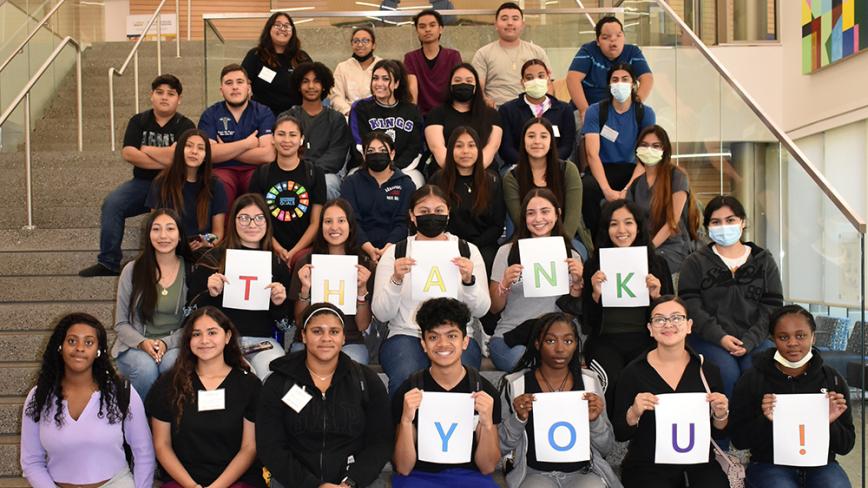University of California’s academic health centers and faculty practices provided $4.4 billion in fiscal year 2021-2022 in programs, activities and care. The benefits, which increased by $345 million over the prior year, aligned with the needs of communities across California and had a focus on youth programs, food security and health equity.
UC Health’s community benefits spending has grown by 9 percent since the 2018-2019 fiscal year when the system first began its reporting. Details of the community benefits are provided in this year’s annual report and included:
- $1.7 billion in net community benefits from UC academic health centers, which is an increase of $28.7 million over the prior year
- $764 million in community benefits from UC faculty practice groups
Community benefits also included significant amounts of care for people covered by Medicare and Medi-Cal for which UC’s health locations are not compensated. The reimbursement gap for UC hospital-based care delivered to people with Medicare coverage was $1.95 billion. UC’s academic health centers also contributed approximately $1 billion in unreimbursed Medi-Cal care as a benefit, which is equal to a quarter of Medi-Cal community benefits care from all tax-exempt hospitals in the state combined. Further Medicare and Medi-Cal uncompensated care occurred at UC faculty practice groups.
Additionally, UC has 20 health professional schools that provide many substantive benefits to communities throughout the state.
UC Health’s community benefits spending compares favorably to California tax-exempt hospitals. Net community benefits from UC’s academic health centers excluding Medicare-related items equates to 9.1 percent of operating expenses, which puts the UC academic health centers as a system in the 70th percentile of comparable tax-exempt California hospitals. The $1.7 billion in community benefits from UC academic health centers is equal to nearly 21 percent of the total spending for the 206 California tax-exempt hospitals combined.
University of California reports on community benefits annually to provide transparency about activities throughout its health system. The report follows guidelines published by the Internal Revenue Service for tax-exempt, non-profit academic medical centers. The standardized reporting enables transparency about the community benefits being delivered and facilitates comparisons to benchmarks for other tax-exempt, non-profit academic medical centers. UC’s academic health centers are not required to file reports related to the community benefits annually with the IRS.
Community benefits are programs or activities that provide treatment or promote health and healing as a response to identified community needs. Examples of programs include:
- Summer Health Institute of Nursing Exploration and Success (SHINES), which is a two-week immersive summer program for current and recently graduated high school students. The UC Davis Health program includes more than 15 sessions in which 38 students participated in the 2022 cohort.
- Community Urban Farm, a health-equity focused program that connects patients who do not have access to fresh produce with a local urban farm’s produce, using grant funds from Veggie Rx, and provides necessary infrastructure for healthy food access. Community Urban Farm is a collaboration with CRECE Urban Farms and UCI Family Health in Santa Ana.
- Sound Body Sound Mind, which serves 152 middle and high schools in LA County and opened five new fitness centers, providing additional locations to support the physical health of nearly 200,000 students. The UCLA Health program tracks results and saw significant improvement in student fitness levels, rising from 39 percent passing state test thresholds to 59 percent after just eight weeks.
- Black Health Equity Initiative: STOP COVID-19, a UCR School of Medicine program that researched community needs to allow tailoring of culturally appropriate services. A resulting toolkit explores some fears within the Black community, one of the hardest hit by the virus that causes COVID-19; addresses questions to separate fact from fiction; and provides resources as well as a mechanism for updates and feedback. Also, the initiative hosted educational Long-Haul COVID-19 town halls.
- Safe Transitions of Care for Vulnerable Populations, which is driven by the UC San Diego Health care management team that helps vulnerable people navigate hospital stays and provides assistance and resources as patients prepare to return home, including arranging free or discounted services to facilitate safe transitions back into the community.
- UCSF Benioff Children’s Hospital (BCH) Oakland Pediatric ACES, Related Life Events Screener (PEARLS) and FINDConnect™. Co-developed and implemented at BCH, PEARLS screen for true primary prevention to identify the most at-risk kids for poor health outcomes, secondary to exposure to trauma. The tool is now widely used across California. FIND addresses the social and environmental factors affecting children’s health outcomes. FINDConnect™ is supporting technology integrated into electronic health records to aid health care professionals in treating social drivers of health such as food insecurity, housing instability, mental health, and developmental issues.
About University of California Health
University of California Health comprises six academic health centers, 20 health professional schools, a Global Health Institute and systemwide services that improve the health of patients and the University’s students, faculty and employees. All of UC’s hospitals are ranked among the best in California and its medical schools and health professional schools are nationally ranked in their respective areas.

